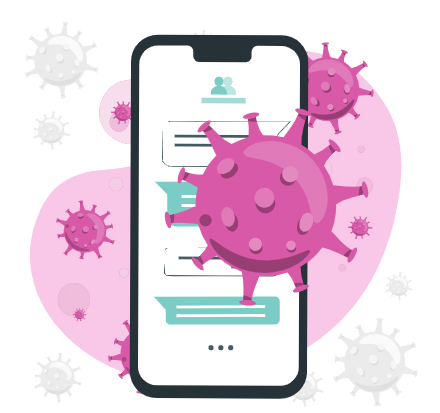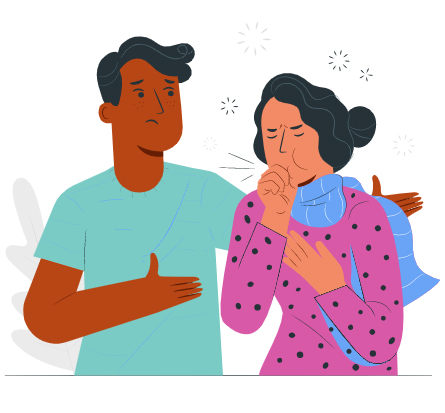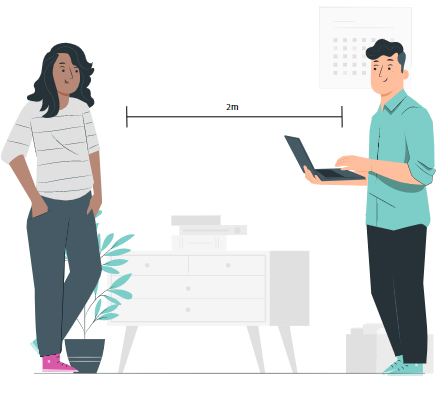TAIGA HEALTH COVID19 RESOURCE CENTER
We all have COVID-19 (Coronavirus) questions.
Here’s a few quick things you can do to slow the spread.

Clean that phone! (FYI – it’s dirtier than your hands).
Clean your phone and other “high-touch” surfaces with household cleaning spray or disinfecting wipes.

Think you have COVID-19 symptoms?
The WHO advises anyone who has a fever, cough and/or difficulty breathing to seek medical attention, whether or not they have a reason to believe they’ve been exposed to the coronavirus.
Contact your primary care provider or book an virtual consultation now.

I can hear you just fine from there, thanks.
Avoid close contact with anyone who is or might be sick. Experts recommend 6 feet of personal space.
TAIGA HEALTH COVID19 QUICK-GUIDE
Here’s some stuff that’s good to know.
What is the novel coronavirus, and is it the same thing as COVID-19?
Coronaviruses are a large family of viruses that cause respiratory infections. The name comes from the crown-like spikes on the viruses’ surfaces (“corona” means “crown” in Latin). Most coronaviruses only infect animals. Of the seven coronaviruses known to infect humans, four of them are very common and cause only mild illness. Two of them, MERS and SARS, are severe. The seventh is the current novel coronavirus, technically called SARS-CoV-2. The illness it causes is called COVID-19.
The virus was first detected in humans a few months ago in Wuhan City, Hubei Province, China, and has since spread globally. This interactive map, from the Johns Hopkins Center for Systems Science and Engineering, tracks the number and location of all COVID-19 cases.
How does the coronavirus spread?
While experts are still learning about coronavirus transmission, the virus mainly seems to spread from person to person. When someone who has the virus sneezes or coughs, they produce tiny respiratory droplets that can travel about 6 feet through the air and land in the mouth, nose or eyes of a healthy person.
It’s also possible to get the coronavirus by touching a surface or an object with the virus on it and then touching your face, although this isn’t thought to be the primary mode of transmission.
The virus appears to be able to survive on surfaces for between a few hours and a few days. A study published in the New England Journal of Medicine found that the coronavirus lives longest on plastic and steel, where it lingered for up to 72 hours, compared to 24 hours on cardboard.
How contagious is the coronavirus?
The virus appears to spread very easily, based on the growing number of people who are contracting the virus without knowing how or where they could have gotten infected. This is called community spread.
To understand how contagious a virus is, epidemiologists determine the average number of people who will contract the disease from a single infected person, within a group that has no immunity to the disease. That average number is called R0. Early data suggests that COVID-19 has an R0 of between 2 and 3. The flu’s is 1.3. But experts will need a lot more data before they can say, with any certainty, exactly how transmissible the coronavirus is.
Who’s most likely to get severely ill from the coronavirus?
While experts stress that anyone can contract COVID-19, some people are especially vulnerable to developing complications if they get infected. The main higher-risk groups, per the CDC, are older people, people with compromised immune systems, and people with underlying health conditions, such as diabetes, COPD and other heart and lung diseases. Although it’s not clear why, preliminary data reported in JAMA also shows higher rates of coronavirus transmission, and resulting hospitalization and death, among men.
The CDC advises members of higher-risk groups to stay home as much as possible, stock up on supplies (medication, groceries, household items), steer clear of crowds and avoid cruises, in addition to taking the same precautions we all need to take.
What symptoms should you look out for?
The most common symptoms of the coronavirus are similar to those of other respiratory infections going around (like the flu): fever, cough and shortness of breath. Symptoms seem to take between two to 14 days to show up, but people may be able to transmit the virus before symptoms show up.
Most reported cases of the coronavirus appear to be mild, although some patients develop serious infections. The World Health Organization classifies a “mild” case as one that doesn’t require hospitalization.
How can you protect yourself from getting sick?
- Wash your hands. Here’s the proper way to do it, according to the CDC: Use soap and water (warm or cold), lathering up and scrubbing the entirety of both hands (including underneath your nails) for at least 20 seconds. Dry your hands afterward, as studies show that wet hands transfer germs more easily. When running water isn’t available, use alcohol-based hand sanitizer or wipes with at least 60 percent alcohol. The soap-and-water method is preferable because it removes certain types of germs more effectively than sanitizer does, especially when hands are greasy or dirty.
- Avoid touching your face (specifically your eyes, mouth and nose).
- Disinfect your phone as often as you wash your hands; dampen a microfiber cloth and add a small amount of regular soap to wipe down your device and its case, then gently pat them dry. The chemicals in disposable wipes or sprays may strip protective treatments from a smartphone’s screen, making it harder to read. “Phones present an extra risk because we keep them so close to our faces, so I recommend using a Bluetooth headset as much as possible,” says Dr. Georgine Nanos, a family medicine doctor in San Diego.
- Keep 6 feet of space between yourself and others.
- Get your seasonal flu shot if you haven’t done so already. While the flu vaccine won’t protect you against COVID-19, it can help you stay in fighting form. Also, the fewer people who have the flu, the more healthcare resources we have to fight the coronavirus. You can CDC’s flu vaccine finder.
Here’s a longer list of tips from the CDC.
Should you wear a face mask?
The CDC now advises everyone (including healthy people) to wear non-medical cloth face masks in grocery stores, pharmacies and any other public place where it might be hard to practice social distancing.
Initially, widespread mask usage wasn’t recommended. But research has since shown that a sizable percentage of people with the coronavirus are asymptomatic — and that people who do go on to develop symptoms can transmit the virus before their symptoms appear. Wearing masks, experts say, can help prevent people who don’t know they’re sick from infecting others.
Cloth masks aren’t the same thing as surgical masks or N-95 respiratory masks, which should be reserved for healthcare workers and first responders.
What should you do if you have coronavirus symptoms?
The WHO advises anyone who has a fever, cough and/or difficulty breathing to seek medical attention, whether or not they have a reason to believe they’ve been exposed to the coronavirus.
Contact your primary care provider before going to their office. Be sure to let them know if you’ve been in close contact with someone who has coronavirus. If you don’t have a doctor to contact, you can also reach out to your local board of health.
Who should be tested?
The CDC permits doctors to order testing for any patient exhibiting coronavirus symptoms. Although providers are advised to prioritize certain categories of symptomatic patients, including members of higher-risk groups and those who’ve been in close contact with people suspected or confirmed to have COVID-19.
Is there any treatment for the coronavirus? What about a vaccine?
There’s no specific treatment for COVID-19 yet, per the CDC, although a number of antiviral drugs are being used experimentally.
While multiple vaccines are being tested in clinical trials, it will take at least 12 to 18 months for any vaccine to become available for widespread use, according to public health officials.
Should pregnant women be particularly concerned about COVID-19?
During pregnancy, the immune system, lungs and heart undergo changes. As a result, pregnant women are often especially vulnerable to becoming severely ill from respiratory infections. (That’s the case for the flu, as the CDC explains here. But while the flu and the coronavirus can cause similar symptoms, they are different viruses.)
The American College of Obstetricians and Gynecologists says there’s not enough information yet about the coronavirus to issue specific guidance for pregnant women.
For now, the CDC recommends that pregnant women take standard preventive measures to avoid infection, such as frequent hand-washing and avoiding people who are sick. If you are pregnant and have respiratory symptoms, or think you may have been exposed to the virus (whether or not you have symptoms), contact your healthcare provider.
If you're healthy, what else should you be doing now?
Stay home to help flatten the curve.

COVID-19 VOCAB
What are they talking about?
What are all these Corona-terms?
Disease reservoir: Yep, it’s exactly what you think a reservoir is.
Like water being stored in a reservoir, a disease reservoir refers too somewhere that infectious agents can survive, other than humans. This can be environmental or other living things.
Incubation period: It may be quiet at first, but it’s just getting organised.
This is the period of time between being exposed to an infectious disease and developing symptoms.
Social distancing: If you don’t do it, Fleetwood Mac was right we’ll “never break the chain.”
By working from home and staying clear of groups of people (small or large), you’re removing yourself from the chain— and in doing so, you are slowing down the spread of the virus.
Self-isolation: Spending quality time with the person who knows you best. You.
You stay inside your own home and avoid contact with other people, including those you live with (where possible), to help prevent the spread of the virus.
Transmission: Think of your email being hacked and sending a virus to everyone in your contacts. Yes, even your ex.
From one person to another, or one population to another, this is how the virus spreads.
Viral load: How bad is it? We want numbers.
The viruses are enemy soldiers, and the viral load is a measure of how many or how few enemy soldiers are present in your body when you’re infected.
Helpful Information
Cold, Flu or Covid-19?
The symptoms are different.

STILL HAVE QUESTIONS?
No problem. We are here to help you.
By registering now, you will have access to our network of doctors and medical professionals. Work around your schedule for once.